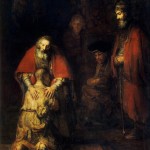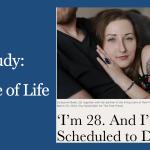The #protfuture conversation continues. First Things editor R.R. Reno has a reflection on it, as a Catholic and also one of the sponsors of the #protfuture event. He notes that while intra-Protestant discussions of the future of Protestantism inevitable involve some discussion of Catholicism, he doesn’t see intra-Catholic discussion about the future of Catholicism involving discussion of Protestantism.
To my dismay and sadness, a lot of Protestants on the internet see me as anti-Protestant, so I may surprise them by saying that if Reno is right, then I would view that as a disaster. The Spirit moves outside the visible boundaries of the Catholic Church, and we should and indeed must learn from our brothers and sisters in Christ who do not profess the Catholic faith. During the #protfuture event, one of the panelists said–in essence, I’m paraphrasing–that Protestants shouldn’t really bother with unity with the Catholic Church, because the Church is so big, “they don’t need us”, and they already have enough on their plate with their own Catholic issues to bother with us. I definitely think that’s a sense we see in a lot of the day-to-day life of the Church–but I would view that as a sin, the sin of self-regard and self-preoccupation. And so let me clearly affirm, discussions on the future of Catholicism must include discussion of Protestantism. (And not just to reject it out of hand, of course.)
With that in mind, let me offer up a couple more stray, inchoate thoughts.
Catholicism’s Protestant future is already in its past. I am referring, of course, to the Second Vatican Council. The Rad Trads have a point: consciously or not, Vatican II was a Protestantizing of Catholicism. Beyond the fact that Vatican II was the starting gun of the Church’s launching into the ecumenical endeavor, the doctrinal emphasis of Vatican II was, so to speak, a ressourcement of Catholicism drawing, among other sources, from the best of Protestantism. Worship in the vernacular. The re-emphasizing of the “meal” dimension of the Mass and, perhaps, a de-emphasis on the sacrificial dimension of the Mass. An affirmation of the centrality of Scripture in the life of the Church. A “re-kerygmatisation” of the theological life of the Church. An emphasis on the necessity of grace and Christ in the salvation story. A re-emphasizing on the dimension of the Church as the People of God, the people of the baptized.
The incipit of this section is obviously a bit trolly. Vatican II is in the Church’s past, but also, obviously, in the Church’s present and its future. Most debates within Catholicism today are really debates about the interpretation of Vatican II, and Vatican II was, very much, a Protestantization of Catholicism. This is something Catholics will never say in polite company because it sounds like they’re validating the anti-Vatican II story about the Council, but let me say as a “Vatican II Catholic”–it’s true! Vatican II made Catholicism more Protestant, and we can see that it is good. Maybe not an unalloyed good–I think that, quite involuntarily, many liturgical choices added up to a dramatic pastoral weakening of the doctrine of the Real Presence–but on the whole, a great and necessary good.
Let me say it: Protestant Catholicism is true Catholicism. It’s a common dig against Protestants to say that they define themselves as being “anti-” (my friend Sam Rocha‘s line: “Protestants protest at being called Protestants”), but in many ways so did Counter-Reformation Catholicism. Protestants think salvation is all about faith and not good works? Then it must be all about good works! Protestants think the Eucharist is a meal and not a sacrifice? Then it must be only a sacrifice! Protestants don’t like Mary-talk? Let’s never stop talking about Mary. This is a caricature, of course.
As I’ve written before, Catholics must affirm salvation by faith alone. Yes, it is a faith that is not mere doctrinal assent, it is a faith that is the indwelling of Jesus Christ by the Spirit which transforms us–the sanctifying grace that Trent so rightly talks about–and equips us for good works, but it is a salvation by sheer grace, through Christ alone.
Catholics cannot affirm Sola Scriptura as a doctrine, but we must also move beyond this sense we se often see of Catholic Tradition as this thing that just sits on top of the Bible. Instead, Scripture is the heart of Tradition, in the Biblical sense, the heart of Tradition which gives it life, a Tradition which itself is the “life of the Spirit within the Church”, which is the body of Christ.
Catholics must rediscover and continue to rediscover the wonderful doctrine of the priesthood of all believers. Adam was the first High Priest, tasked with liturgically divinizing the world, and we are in the priesthood of the New Adam, working in the vineyard of the Lord to usher in the New Creation that has broken through on Easter morning.
Vatican II isn’t dead. It isn’t even past. It’s the future–our Protestant future.
Catholicism’s Protestant future is visible in the Global South. Not to make a dig at Reno, but the idea that Protestantism doesn’t feature in discussions about the future of Catholicism is very West-centric. In the Global South, the reality of Catholicism is the astonishing growth of Protestant Pentecostalism (a challenge, I’m sure, also for traditional Reformational Protestants). As über-chronicler of Catholicism John L. Allen Jr notes, the future of Catholicism is the Global South. Already two thirds of Catholics live in the Global South and if current trends continue, this proportion will only increase. If you talk to bishops in the South about the future of Catholicism, Protestantism is quite on their minds. But it is not only an adversarial relationship (Allen tells the story of asking a bishop in Latin America about his relationship with Pentecostals, and the bishop says: “You want to know about my relationship with Pentecostals? Come.” and the bishop takes Allen outside his office and points to a very large billboard blaring: “Next Sunday’s Sermon: The Great Sins of the Catholic Church”. (Note: this is also a good idea for a theme for a Catholic homily. #ecumenism)), because a great many of the Global South’s great many Catholics are Charismatic Catholics, that is to say Catholics who have incorporated Pentecostal practices, and also a significant amount of theology, and the Charismatic Renewal is one of the fastest growing movements within the Church. You could be forgiven for thinking that, in that sense, and for good and for ill, the future of Catholicism is inevitably Protestant.
















